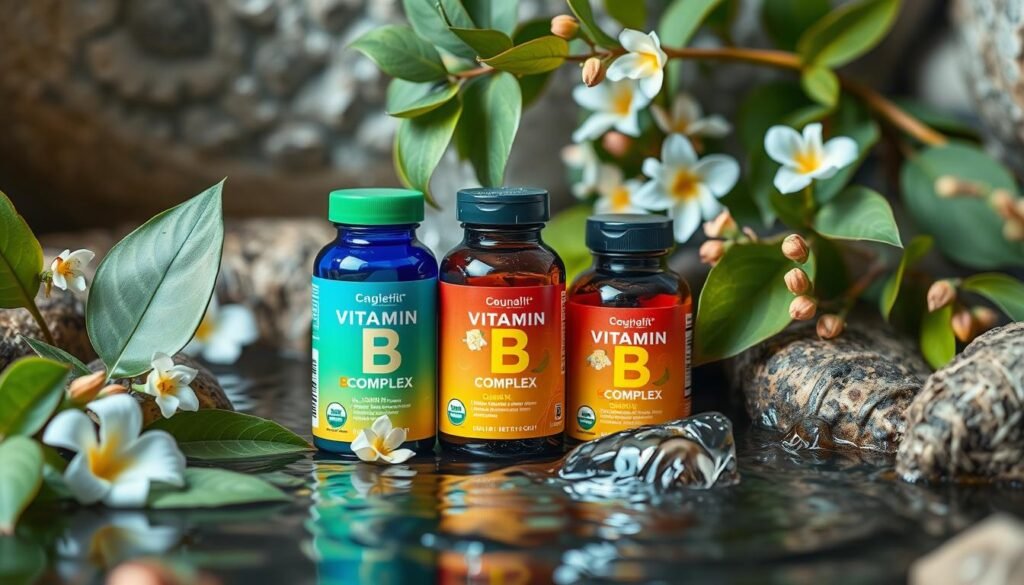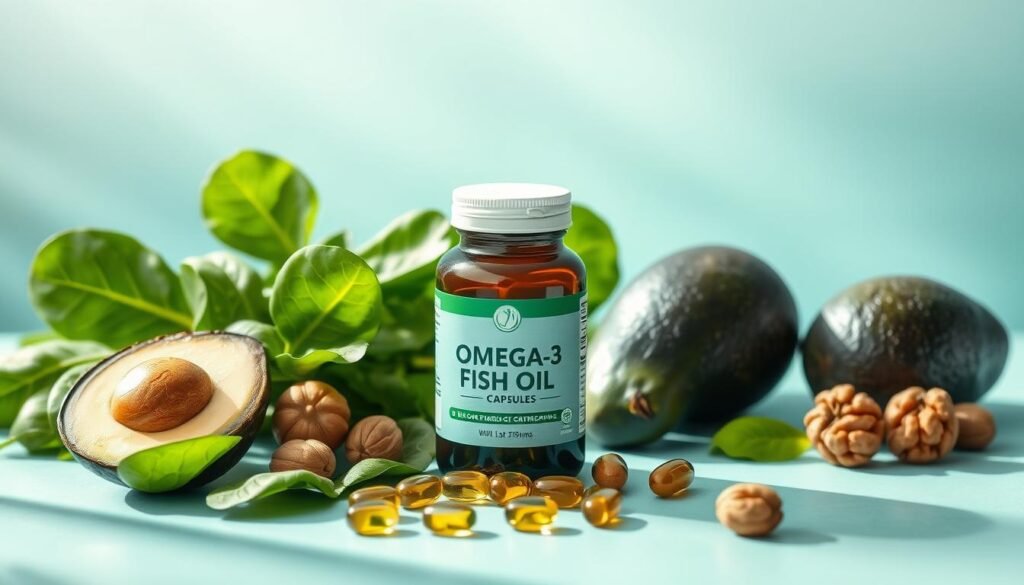About 19% of US adults face anxiety disorders every year. This sheds light on the urgent need for effective treatments. People are turning to natural solutions like vitamins instead of traditional medicines. Studies show vitamins like D and B complex are key in mental health. They could help ease anxiety. In this article, we dive into the top vitamins for naturally calming anxiety. We’ll see how they can improve our mood and life quality.
Key Takeaways
- Vitamins D and B complex are essential for effective anxiety management.
- Research supports that magnesium can help alleviate anxiety symptoms.
- Omega-3 fatty acids have shown promise in reducing anxiety levels.
- Herbal remedies may supplement vitamins, providing additional relief.
- Consulting healthcare professionals is crucial when selecting dietary supplements.
Understanding Anxiety and Its Impact
Anxiety greatly affects a person’s daily life and overall happiness. It shows up as both physical and emotional signs. Knowing what anxiety is and how widespread it is helps in dealing with it.
What is Anxiety?
Anxiety makes people feel worried, uneasy, and scared in a way that messes with everyday life. It’s a common response to stress. However, when these feelings are too strong, they might be signs of an anxiety disorder. Anxiety comes in different forms, like generalized anxiety disorder, panic disorder, and social anxiety disorder. Each kind has its own challenges and might need different ways to handle it.
Common Symptoms of Anxiety
Those with anxiety often face a mix of symptoms that change in severity. Some frequent symptoms are:
- Increased heart rate
- Excessive sweating
- Muscle tension
- Sleep problems
- Feeling restless or wound up
- Hard time concentrating
It’s important for people to recognize these symptoms to manage their mental health and find the right treatment.
The Prevalence of Anxiety in the U.S.
Anxiety is a major public health concern. Studies show that over one-third of Americans will face an anxiety disorder at some point. A 2019 survey found that about 44% of adults felt anxious. Given these numbers, tackling anxiety is key to improving mental health nationwide.
The Role of Vitamins in Mental Health
Vitamins help keep our minds healthy. They play a big part in controlling our mood and how our nervous system works. If we don’t get enough of certain vitamins, we may feel more stressed. This can also make anxiety and depression worse. Studies show that vitamins are key for our mental health. Some can even help with anxiety naturally.
How Vitamins Affect Mood and Stress Levels
Many vitamins are important for our moods. For example, the vitamin B group is crucial for thinking clearly and feeling balanced. Not having enough can lead to trouble thinking and feeling irritable. Vitamin B12 is especially important for older people. It helps prevent mood swings and feelings of paranoia.
Vitamin D is another important one. If we don’t get enough, it can lead to depression and mood disorders. Making sure we have these vitamins can help manage stress and make us feel better overall.
Natural Remedies for Anxiety and Their Benefits
Natural remedies like vitamins and minerals can help reduce anxiety. Folic acid, for instance, can make antidepressants work better and is really helpful for women. Taking 250 mg of thiamine every day can also help with anxiety. Health experts recommend eating well to support mental health. Here’s a look at some important vitamins and their benefits:
| Vitamin | Effects on Mental Health | Recommended Intake |
|---|---|---|
| Vitamin B Complex | Cognitive improvement, mood stabilization | Varies by type; consult a healthcare professional |
| Folic Acid (B9) | Boosts antidepressant effectiveness | 1 milligram daily |
| Vitamin B12 | Mood swings, supports cognitive function | 2.4 micrograms daily |
| Vitamin D | Reduces depressive symptoms | 600 to 800 IU daily |
It’s smart to talk to a doctor before starting any vitamin supplements, especially if you have mental health concerns.
Vitamin D: A Key Player in Anxiety Relief
Vitamin D is crucial for our health, impacting many body functions. It can influence our mental state significantly. People with low Vitamin D often face higher risks of anxiety and depression. There’s evidence that taking vitamin D helps ease anxiety symptoms, especially in those low on the vitamin.
The Connection Between Vitamin D and Mental Health
Vitamin D affects our mental health greatly. Research shows a link between low vitamin D and more anxiety and depression signs. One study found vitamin D supplements could help people with mental health issues. Another study showed that people with less vitamin D felt more anxious. Keeping enough vitamin D might help keep our minds healthy.
Effective Dosage Recommendations
It’s important to find the right vitamin D amount for mental health. Doctors suggest taking 1,600 IU daily for those low on vitamin D to ease anxiety. Always check with a healthcare provider to adjust the dose for your specific health needs.
Sources of Vitamin D
We can get vitamin D from the sun and our diet. Sunlight is a major source; a little time in direct sunlight is recommended each day. Our diet helps too, with good sources like:
- Fatty fish (such as salmon and mackerel)
- Eggs
- Fortified foods, like cereals and juices
- Dairy products, including milk
If food and sun aren’t enough, vitamin D supplements, in liquid or pill form, can help. Supplements are a good way to make up for what’s missing. They’re really helpful when there’s not much sun.
Vitamin B Complex: The Best Vitamin for Anxiety
Vitamin B complex is made up of crucial nutrients that affect our nervous system. Studies show lacking specific B vitamins can worsen anxiety symptoms. Getting enough vitamin B is key for mental health and well-being.
Several B vitamins, like B6, B12, and niacin, help control mood and manage stress.
How B Vitamins Influence the Nervous System
B vitamins are essential for our nervous system. They help make neurotransmitters, which are vital for brain signals. Vitamin B6, for example, boosts GABA to calm the nervous system.
Research shows combining B6 with magnesium can greatly reduce stress. Vitamins B1, B3, and B5 also help lower anxiety. This highlights the B complex’s broad benefits for mental health.
Sourcing Vitamin B: Foods vs. Supplements
Natural sources of vitamin B are whole grains, leafy greens, eggs, and dairy. These foods are vital for mental health. Yet, it’s hard for vegetarians or vegans to get enough from food alone.
In these cases, B complex supplements are a good option. They prevent deficiencies and support mental health. Products like Llama Naturals’ Plant-Based Multivitamin offer a wide range of B vitamins for anxiety management.

| Vitamin | Function in Reducing Anxiety | Natural Food Sources | Supplementation Notes |
|---|---|---|---|
| B1 (Thiamine) | Helps in neurotransmitter synthesis | Whole grains, legumes, nuts | 250 mg recommended for anxiety |
| B6 (Pyridoxine) | Increases GABA levels | Poultry, fish, potatoes | 100 mg daily can reduce anxiety symptoms |
| B12 (Cobalamin) | Supports brain health | Meat, dairy products, fortified cereals | Supplements may be necessary for vegans |
| Niacin (B3) | Has a sedative effect | Poultry, fish, whole grains | Affects neurotransmitters similar to anti-anxiety meds |
| Folate (B9) | Essential for serotonin regulation | Leafy greens, beans, eggs | Involved in the mental health process |
The Benefits of Magnesium for Anxiety Management
Magnesium is key in controlling anxiety and stress. Nearly 70% of Americans don’t get enough magnesium. This nutrient helps keep emotional balance and manages stress well. Studies show that people with enough magnesium handle anxiety better because it helps regulate stress.
Magnesium’s Role in Stress Regulation
Studies suggest magnesium can ease anxiety symptoms. For example, magnesium glycinate may improve sleep and lower inflammation, crucial for mental health. Also, magnesium threonate, with its superior absorption, boosts brain magnesium levels and supports cognitive functions. This highlights magnesium’s value in managing anxiety, linking brain health to mood directly.
Recommended Daily Intake
The daily magnesium needs vary by age and gender. Typically, women need about 320 mg, and men need 420 mg daily. Many diets lack enough magnesium due to modern farming and food processing, which lower its levels by up to 80%. Including magnesium-rich foods like leafy greens, nuts, seeds, and fish can help achieve the daily requirement.
Though supplements might help, knowing their side effects is important. Taking too much magnesium, over 2500 mg, can cause serious health issues like toxic hypermagnesaemia. Side effects from supplements often include diarrhea. People with kidney issues should talk to a doctor before taking more magnesium.
| Form of Magnesium | Bioavailability | Effects on Anxiety |
|---|---|---|
| Magnesium Glycinate | High | Supports sleep and reduces inflammation |
| Magnesium Threonate | Very High | Improves cognitive function |
| Magnesium Taurate | High | Increases brain magnesium levels |
| Magnesium Oxide | Low | Less effective for anxiety |
| Magnesium Citrate | Low | Less effective for anxiety |
Omega-3 Fatty Acids and Their Anxiety-Reducing Properties
Studies show omega-3 fatty acids lessen anxiety symptoms. They’re important for the brain, improving mood and mental health. Research involving 19 clinical trials with 2,240 participants found omega-3s, especially in high doses over 2000 mg daily, greatly reduce anxiety. This suggests omega-3s could help those dealing with anxiety.
Link Between Omega-3s and Anxiety Symptoms
Omega-3s are known to calm anxiety, particularly in those with anxiety disorders. They prove effective, with a noted improvement in symptoms. The fatty acids EPA and DHA in omega-3s are key. EPA fights inflammation while DHA supports brain function.
Best Dietary Sources of Omega-3s
To add omega-3s to your diet, look at these sources:
- Fatty fish such as salmon, mackerel, and sardines
- Flaxseeds and flaxseed oil
- Chia seeds
- Walnuts
- Algal oil, a vegan alternative
Supplementation Considerations
When taking omega-3 supplements, dosage and safety are key. Experts recommend 1,500 to 2,000 mg daily for mental health. It’s important to choose supplements tested for purity. Those on blood thinners or with conditions should talk to a doctor before starting omega-3s.

The American diet usually has more omega-6 than omega-3, which isn’t good. More omega-3 can boost mental health and reduce anxiety. For an in-depth look at omega-3 and anxiety, click here.
Herbal Supplements: An Adjunct to Vitamins
Many people looking for anxiety relief have considered herbal supplements along with vitamins. These natural options, like chamomile and lavender, are becoming more popular in managing anxiety. It’s important to know about their safety and how well they work.
Popular Herbal Remedies like Chamomile and Lavender
Chamomile is known for its ability to ease Generalized Anxiety Disorder (GAD) symptoms. Its calming properties are believed to come from its natural ingredients. They help relax the mind and lower anxiety. Lavender is famed for its stress-relieving scent. It has been used for a long time to boost mood. Adding chamomile tea or lavender oil to daily activities can offer gentle support against anxiety.
Safety and Efficacy of Herbal Supplements
Herbal supplements seem promising but they come with a need for caution. The effectiveness and safety of herbs can vary. They might also affect other medications. For example, kava has shown positive effects for mild to moderate anxiety. However, it can have mild side effects. Research on herbal solutions for anxiety is mostly positive, showing them as good options for many. Always check with a healthcare provider before starting any new herbal treatment.
| Herbal Remedy | Main Benefits | Considerations |
|---|---|---|
| Chamomile | Promotes relaxation, reduces anxiety symptoms | Generally safe, but may cause allergic reactions in some |
| Lavender | Calming effects, may improve sleep quality | Can interact with certain medications |
| Kava | May help with mild to moderate anxiety | Potential liver toxicity risk, consult doctor |
| St. John’s Wort | Limited effectiveness for anxiety disorders | Known for interactions with various medications |
| Valerian | May improve sleep and reduce anxiety | Can cause drowsiness; caution advised when driving |
Choosing the Right Supplement for Anxiety Relief
Finding the right supplements for anxiety relief is important. You should look for safety, reputable brands, and clear ingredient information. There are many options out there, each offering benefits for mental health. Making an informed choice can lead to better results and satisfaction.
What to Look for When Shopping for Supplements
When looking for anxiety relief supplements, focus on these points:
- Transparency: Make sure the product label lists all ingredients, dosages, and possible allergens.
- Reputable Brands: Pick products tested by third parties for purity and effectiveness.
- Research Support: Choose supplements backed by scientific research for effectiveness.
- Formulation: Think about if the supplement has ingredients that work well together.
Consulting Healthcare Professionals
Talking to healthcare providers before starting supplements is crucial. It makes sure the supplements won’t negatively affect current medications or health conditions. A healthcare provider can give advice based on your health history and recommend proven products.
Potential Interactions with Medications
Knowing about potential interactions is important. Some supplements can affect prescription medications or increase side effects. Talking with healthcare providers can help avoid these issues. If you’re looking for options, reliable sources can help guide you through the choices.

Lifestyle Changes to Support Vitamin Efficacy
Making your vitamin E work better for anxiety means changing how you live. Starting with a balanced diet, adding regular exercise, and managing stress well can help. These steps taken together boost both your mental health and total wellness. It’s key to eat well to help with stress.
The Importance of Diet and Nutrition
Eating right supports your mental health. Foods high in antioxidants, vitamins, and minerals are crucial. They help keep your brain working well. Vitamins like B and D, and minerals such as magnesium, aid in controlling anxiety. For anyone dealing with anxiety, eating these nutrients is essential. Focusing on nutrition can relieve stress. Aim to eat a mix of fruits, veggies, whole grains, and healthy fats to get all the nutrients you need.
Exercise and Mental Wellbeing
Exercise is a powerful way to fight anxiety. It makes your body release endorphins, which boost your mood. Doing things like running, yoga, or swimming benefits your body and mind. For those facing anxiety, regular exercise can help maintain emotional stability. It plays a key role in making lifestyle changes to manage anxiety.
Stress Management Techniques
Using good stress management methods helps vitamin E work better for anxiety. Techniques like mindfulness, deep breathing, and muscle relaxation work well. They can lower anxiety levels. Adding these practices to your daily life helps your mental and emotional health. It’s an effective way to build your resilience against stress.
Conclusion
This article has shown that vitamins D, B, and magnesium are key in fighting anxiety. These nutrients, along with herbal supplements, can be very helpful. With anxiety and depression increasing, especially in women and young people, finding full strategies is key. These should include both supplements and changes in how we live.
To really fight anxiety, we must know how important certain vitamins are and choose our diet and actions carefully. Making sure we get enough magnesium, using ashwagandha for calm, and understanding the roles of vitamins B6 and B12 are all steps we can take. We also need to remember it’s very important to talk to doctors before starting new health routines. This helps make sure the approach is safe and right for us.
Dealing with anxiety works best when we use a full approach that includes the right food, behavior changes, and sometimes supplements. With the information in this article, people can use science and practical advice to get better mental health. This can help improve not just mental health, but how good life is in general.